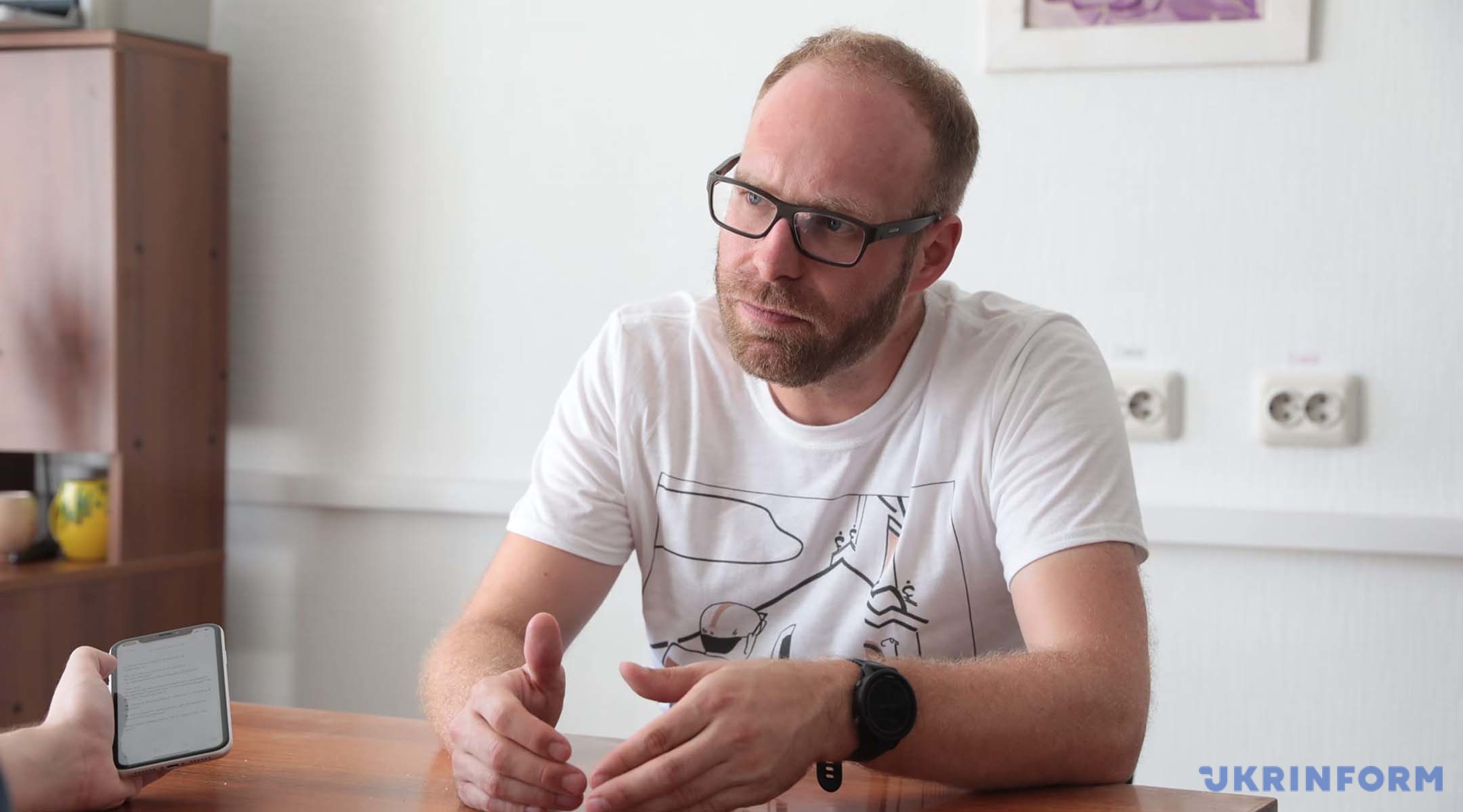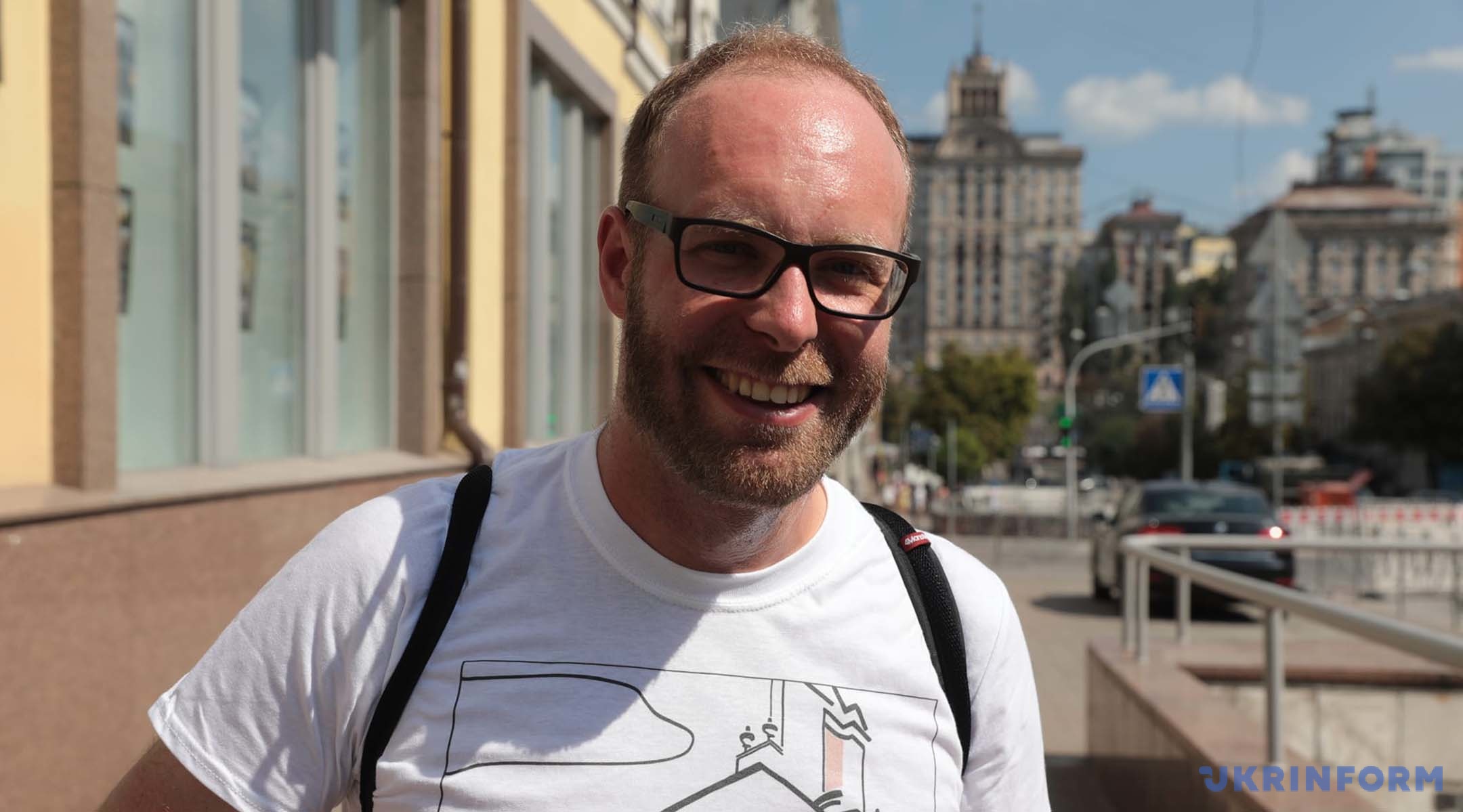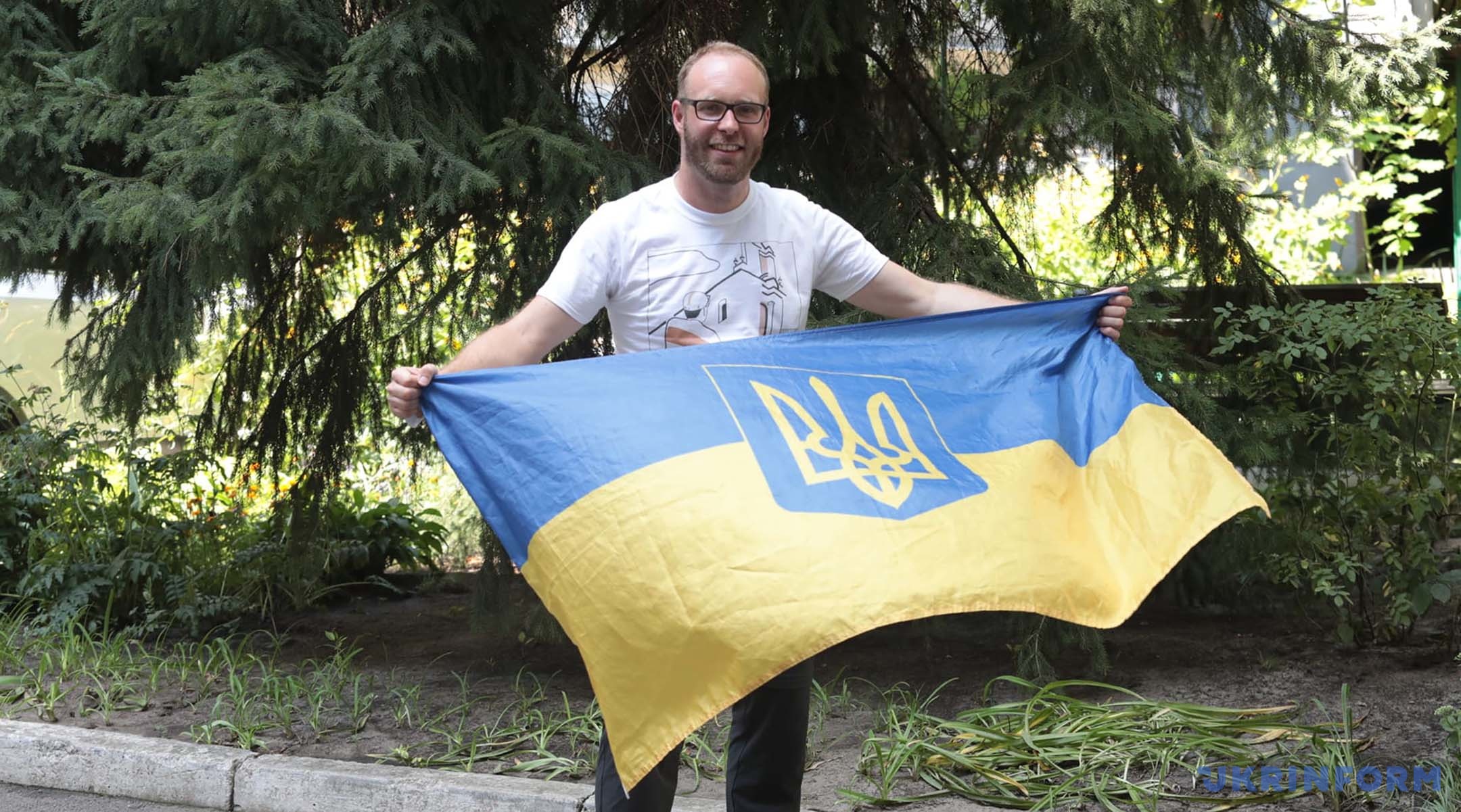Michael works as a journalist in Luxembourg. Living 2,000 kilometers away from Ukraine, he realized he could not stand aside when the enemy brought war into our home. In winter, he came to Kyiv with a convoy of humanitarian aid and decided that he got to return to Ukraine. That is how his idea to carry out a charity bicycle tour from Luxembourg to Kyiv was conceived.
In six weeks, Michael covered 2,725 km to draw the attention of Europeans to our country and collect money for charity. At the start, the Minister of Foreign Affairs of Luxembourg rode along his side, and many of our compatriots helped him along the way. Ukrinform talked to Michael Merten about his tour, what he had raised money for, and about the attitude of Luxembourgers toward Ukraine.
I DID NOT KNOW WHETHER IT WAS A GOOD IDEA TO COME TO A COUNTRY IN A WAR
— Michael, is this bike tour only your project, or others were engaged in it?
— It started as a personal project. To briefly tell the story, I live in Germany, Trier, but I work in Luxembourg. I have contact with one NGO, founded by Ukrainians in Luxembourg called LUkraine. They invited me in early December 2022 to Lviv. So, I came for the first time to Ukraine on Christmas 2022.
Together with volunteers, we brought 16 ambulances and fire trucks to Ukraine. But it is not the only convoy. They have sent dozens of convoys for all this time. They even sent armored ambulances for the military. That was a project within the Luxembourg state support of Ukraine. They also get a lot of donations and care about refugees.
I spent some days in Lviv, took the train to Kyiv, and arrived there on Christmas Day. I met great people and spent some good days despite this situation. I felt very close to the country, to the people. I was on the glass bridge on a beautiful winter day – with an air alarm also. I was looking down at the Dnipro River, thinking: "Wow, this is such a magical atmosphere now! I want to come back."
My hobby is cycling. I have done several big projects where I just cycled for the longest was eight weeks from Rome, Athens, to Jerusalem. I decided I go to Kyiv and combine it with a charity tour. I did not know whether it was a good idea to come to a country in a war. I asked several Ukrainian people: "Should I do it, or is it a stupid idea?" All of them told me that it was a great idea.
— No way it is a stupid idea.
— But I mean, I could understand when people say, for example: "Are you crazy? We have war. We don't need some crazy cyclist coming." But no one said that. So, I started to plan it. I made a deal with my boss and started on the first of July with the support of the foreign minister of Luxembourg Jean Asselborn. I asked him to come to support my project, and he agreed. It was a really rainy day. I would understand if he did not come, but he took his bike and cycled through the rain to the start of my tour. He even messaged when I started to Dmitro Kuleba.

— But how did the people of Ukraine welcome you when you crossed the border and within Ukraine?
— Even before I crossed the border! I was coming close to Krakow, and I got a text message from a woman called Irina. She is Ukrainian but lives in Luxembourg, not as a refugee. She offered me help. I agreed, so she organized a staying for me in Krakow with Ukrainians, who helped me a lot and gave me a lot of contacts.
After a while, I had a group of supporters. All of them hosted me for some time. They organized meetings with cyclists in Ivano-Frankivsk and Vinnytsia, where was a big reception. There were, I think, 30 or 40 children, teenagers, and also grown-ups. They have a cycling or a sports school there. They all welcomed me, and we cycled together to the city. It was really impressive!
— You did not try to get from the border to Kyiv as fast as possible. You tried to cover as many places as possible, didn’t you?
— Yes. I had to return to work on August 19, but I knew I wanted to spend as much time in Ukraine as possible. I had some idea of how to ride, but it had changed a lot. I also met Serhiy, who came to Irpin to pick me up and bring me to Kyiv, which was extremely helpful. He introduced me to many people and veterans, which helped me to understand this country much better.
So, I am proud to say that this tour, which started with the support of some friends that cycled with me, really became, let's say, a Luxembourgish-German-Ukrainian project.
— Russian shellings never stop in Ukraine. Did you happen to seek shelter during air alarms during your ride?
— Of course, I had some air alarms. But I see I have come in a kind of calm period. For example, I stayed in Irpin. And they told me it was calm only four nights in the whole month of May
I went to a shelter last year. This time, to be honest, I learned to adapt: I look around, and if people are running, then I would probably also run. If they are calm, I am calm.
THE MESSAGE OF MY TOUR MEANT A LOT TO UKRAINIANS
— About your crowdfunding program. Unfortunately, riding a bike does not produce income all by itself. How did you get the money for donations?
— I wanted to raise awareness about the situation and show solidarity, of course. I started a blog. I have made a lot of work on social media, where many people reacted, a lot of Ukrainian, of course, people from Luxembourg, from Germany.
One thing was writing about what I see and who I meet, telling people more about Ukraine from a very personal perspective, not like the news, when people open their phones and read about an attack and how many people died this night. I think this attracts more attention.
Of course, I wanted not only to have a nice holiday. I also wanted to raise money via donations and asked the people to support this charity tour and donate. Right now, it is about 3,500 euros. Could be more. There is coming more. I work for a newspaper in Luxembourg, where there is always donation information. Luxembourgish TV and Radio interviewed me. So, I hope that there will be some more attention.
It goes on, but to be honest, it is like a water drop on a big sea. I was hoping for a bit more money. At some point, I was a bit disappointed, but many people in Ukraine told me the financial thing is not so important here — the message is much more important. You look into the face and realize that it means a lot to them. That gave me a lot of power.

— Well, in Ukraine, we say there is no such thing as a small contribution. We encourage people to donate even 8 hryvnias. This is the ride for subway. So, what are you going to spend this money for?
— Because you talked about small donations, I just wanted to mention one really nice moment that I had. I was in a village somewhere behind Ivano-Frankivsk. And I just needed some shadow, so I went to the bus stop, and there was an old lady. We started to talk via translator. I told her I made this project, and she donated 100 hryvnia. I knew that for such a lady from the village who had not much of money. For her, this was a lot. I was really honored and happy.
What is the money for? I have two project partners I trust, and I know. One is LUkraine, the Luxembourgish NGO. They have a local partner in Kharkiv, and the money is spent on food and supply packages for the Kharkiv region. The other project is the project by the Charitable Foundation of the Ukrainian Chamber of Commerce here in Kyiv. They have a project for children's rehabilitation near Uzhhorod, where children from different parts of Ukraine can spend some calm and nice days, and just have a normal life, playing music, painting, whatever.
THE PEOPLE OF LUXEMBOURG UNDERSTAND WHAT IT MEANS TO BE OCCUPIED
— You mentioned that the foreign minister of Luxembourg supported you, right? But talking about ordinary citizens, what is the common notion towards Ukraine? Are there people who believe it is about them, too?
— I got some nice messages from people: "Wow, this is a really great project. We are proud that you go".
Another important moment in Luxembourg: at the very beginning of the large-scale invasion, the foreign minister said in a speech in the Parliament that February 24 for Ukraine is what for us May 10. In 1940, it was the day during World War II when Nazi Germany invaded and occupied Luxembourg. All families remember those who suffered, who died in concentration camps because, for example, they resisted or did not want to serve in the German army.
The people of Luxembourg understand what it means to be occupied. That is also why, already at the end of February 2022, Luxembourg was able to send NLAWs and several other military stuff to Ukraine at a time when in Germany, they were still debating whether we should send some helmets or some water bottles. The debate took much longer.
I am German. I can say there is a mentality that Russia is our partner and — a very important thing to mention — the German perspective on responsibility for Word War II, that no country suffered more than the Soviet Union. But we totally forgot that the Soviet Union is not Russia. There are a lot of people who suffered here in Ukraine from what our ancestors did. I was happy today to go to Babyn Yar, for example, and see what happened there. Ukraine suffered a lot from what the Germans did. But it took a long time to understand this.
I am happy that the common sense in Germany and Luxembourg is that we have to defend Ukraine and support it.

— I am shocked. Did it really take that much effort to convince people that Ukraine was a part of the Soviet Union that suffered from Nazi occupation?
— Honestly, I think it was just beyond the public attention. Even when there was Maidan, I was celebrating. But still, there has been a lot of Russian propaganda for decades. "It's corruption. They treat Russians in Ukraine very badly. Maybe it's snipers, maybe, it's the CIA on Maidan, whatever."
There was a lot of propaganda and conspiracy theories. There was a lot of uncertainty, and many people believed there was something shady in Ukraine, let's say.
That changed a lot last year.
— Can we conclude that there are much fewer Putinverstehers and so-called "pacifists" in Luxembourg?
— Yeah, but there are also a lot of convinced pacifists. I have a good friend Carsten. He went to many Easter demonstrations against militarization, against the wars in Iraq and wherever. But a lot of them changed their mind. Carsten, for example, texted me. He said that from the very beginning, he understood we need to support Ukraine with weapons. And that is for someone who is coming from the left-wing part and for his whole life has been fighting against nuclear weapons.
THE LARGE-SCALE INVASION FORCED US TO UNDERSTAND UKRAINIANS BETTER
— You mentioned that this bike tour is not your first visit to Ukraine. When did you realize you cannot turn your back on Ukraine?
— The beginning of the large-scale invasion forced us to understand Ukrainians better and read more about Ukraine and its history. There was the destruction of the belief that everything will be fine and there will be no war. Many people and I could not imagine it and were naive. However, I think the shock started a process of rethinking.
I was happy to come in December last year. I talked to people, understood them, and explained to them how people in Germany or Luxembourg were thinking.
— You arrived at Kyiv. Your bike tour is over. What is going to be next?
— Next is going to be back to real life, see my family, and see my friends. I also have to earn money, not spend it — 100% of the donations are for the charity projects. Every coffee I buy, every hotel I check in are my own expense.
I think it is going to take some while also to rest. I had such great meetings with great people. It was a lot of impressions, and my brain needs some time to proceed with all that.
I try writing a book about my journey and the great people I met. It is going to be a book about Ukrainian and West European mutual understanding from what I learned from the people here and, maybe, also what Ukrainians learned, how the people in Luxembourg, in Germany, think about all that. That is going to be my next project.
Ivan Kosiakin, Kyiv
Photo: Hennadiy Minchenko
